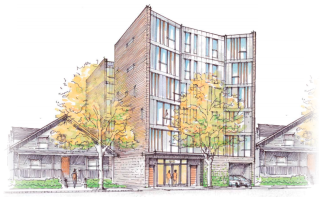Dear Davis City Council, Planning Commission, and Social Services Commission Members,
I would like to take a moment to address the idea of removing R-1 single-family zoning that is popular with developer interest groups and YIMBYs at the moment. This radical policy change would allow investors to buy single family houses in any neighborhood in the city and replace them with 4-unit or more multi-unit complexes. A good way to look at this type of proposal is as deregulation and trickle-down housing. The removal of R-1 zoning is often suggested by these pressure groups as a panacea for creating affordable housing and ending homelessness. There is mounting evidence that this is just not true, and I strongly recommend you read this article on the downfalls of trickle-down housing. https://www.housinghumanright.org/trickle-down-housing-is-a-failure-heres-what-you-need-to-know/?fbclid=IwAR2a_TkSVF0Zlb6pSMrZ7n3fL3SfLHAh354XQN3NZZuL6TNs85r5eST5iqc
In Davis we have a large demand for rental housing. That demand coupled with an abolition of R-1 single-family housing zoning will result in investors converting single family homes to 4 units or more (per lot) of student rental housing that will be leased at top dollar. This is most likely to occur in what are currently the most affordable neighborhoods, like Davis Manor. These are also the most diverse neighborhoods. This will increase the cost of housing in these neighborhoods. This is the opposite of creating the affordable housing that deregulation advocates claim will come as a result of their trickle-down theories. Deregulation will hurt the people who need affordable housing the most.
I want to focus now on what does create and facilitate the production of affordable housing. What does create affordable housing is inclusionary zoning policies and affordable housing overlays. What creates affordable housing is policies designed specifically to do so.
Inclusionary Zoning (IZ) is a type of municipal planning ordinance that require new construction have a portion of the projects set aside for people with lower incomes. Davis long had a strong inclusionary zoning policy, but it was dramatically weakened more than three years ago with an interim ordinance. That interim ordinance was adopted the same night and immediately preceding the City approving the Nishi project with the lower standards. Since then, there has been talk of passing a permanent ordinance and restoring some of the higher standards, but the City process on this seems to have no drive, and there does not seem to be any permanent inclusionary zoning policy in the works. Frankly, the City simply must do better and radical policies like abolishing single family R-1 zoning to create trickle down affordable housing can’t be taken seriously while the inclusionary zoning ordinance remains a weak shadow of its former self.
Another great way to create affordable housing is with Affordable Housing Overlay Zones (AHOZ). An AHOZ is a zoning that coexists with other zoning like R-1 and encourages the creation of affordable housing. Developers and investors are given incentives like an easier approval process, or more allowable units (density bonuses) to encourage investors and developers to create affordable housing without having to compete directly against large market-rate housing investors. An excellent example of this is what is being done in Cambridge Massachusetts, where they have a 100%-Affordable Housing Zoning Overlay. As the City of Cambridge website explains,
“Affordable housing developers often cannot compete with market-rate developers who can afford to pay more for land and buildings. There are also areas of the city where current zoning makes the creation of new affordable housing infeasible. Allowing affordable housing providers to build more densely than market-rate developers will create opportunities in these neighborhoods. Affordable housing developers have also faced long and costly permitting challenges delaying their ability to complete new affordable units. Streamlining the approval process for new 100%-affordable housing will help reduce development costs and allow affordable housing providers to create new affordable units more quickly while using public funding more effectively.”
Cambridge set out on an intensive public engagement process that started in 2018 and concluded with the adoption of the 100% Affordable Housing Zoning Overlay Ordinance in October of 2020 (during the pandemic even!) Both Cambridge’s process of community involvement and the resulting ordinance should stand as excellent examples of what is possible for Davis.
You can learn more about the Cambridge ordinance here:
In conclusion, I urge the Council not to follow the YIMBY and developer recommendation of deregulation and trickle-down housing, and instead explore, with a robust amount of community engagement, actual policies aimed at addressing affordable housing issues. Market deregulation and trickle-down housing will do nothing, or worse, for affordable housing in Davis. What creates affordable housing is specific policies designed to create affordable housing, like Inclusionary Zoning, and Affordable Housing Overlay Zones. I therefore urge the council to reject the YIMBY proposals and explore actual affordable housing proposals.
Frankly, it is appalling that the Housing Element Committee (HEC) was allowed to recommend these policies brought to them by a developer lobbyist who served as a HEC committee member without disclosing their lobbying activities. The Council can and must do better than the HEC did.
Please also consider this a comment on the Draft Housing Element.
Best Regards,
Colin Walsh




Leave a comment